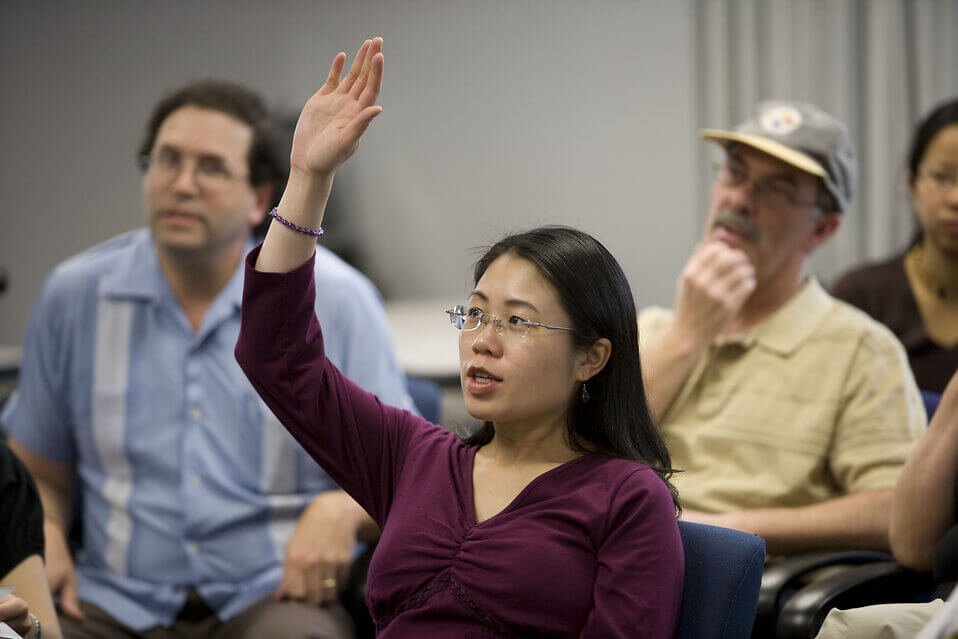Training Programmes
Our extensive range of specialised programmes, available online and in-person, will provide solutions to all your training needs. Our consultants work closely with you to design and deliver the right fit for you and your team
The skills we train
Presentation
Pitching
Public speaking
Meetings
Communication
Difficult conversations
Speaking up
Strategic storytelling
Unconscious bias
Leadership
Executive presence
Leadership in practice
People
Diversity
Assertiveness
Time Management
Team Building
Business
Consultative Selling
Influencing and Negotiating
Networking
Facilitation
Chairing Meetings
Train the Trainer
Master of Ceremony
Media
Media handling skills
Writing
Better business writing
Presentation Skills
Pitching
Many great ideas fail to come to fruition. And many people don’t receive the recognition they deserve. For no matter how good your services or your product, if you can’t be convincing ‘across the table’ – or on a screen – you’re unlikely to realise your full potential.
-
How to build the essential ingredient of all successful pitching - Trust. To quote Joe Girard (one of the greatest salespeople of the 20th century) “I never sold a car, I sold a Girard”.
Being able to approach every pitch with confidence and credibility.
Knowing why you’re different and how to convince others that you’re special.
Public Speaking
Many people secretly admire those who can get up on a stage and – seemingly with little effort - hold any audience in the palm of their hands. But what so many people fail to realise is that the techniques used by the most successful speakers are not only really simple – they’re also within everyone’s grasp. First step is to know what these techniques are. Second step is to practice.
-
Revelation of the techniques used in relaxed conversation and how they can be replicated when presenting (and probably not relaxed!).
Learn how to use notes - even read a script word for word - without losing audience attention.
Designing a persuasive and memorable presentation using a classic story line structure.
Uses and abuses of PowerPoint slides.
Meetings
One of the biggest challenges when asked to speak at a meeting is having too much to say and not enough time to do it. And the bad news is that this is going to get worse - the more knowledge you have, the harder this becomes. The good news is that there are techniques to resolve this - simply, instantly, and forever.
-
Learn best practice for the 5 critical stages of the meeting process: Planning and preparation, Informing, Controlling, Summarizing and Following up.
Be heard in meetings, keeping contributions short, relevant and to the point and learn to structure and deliver a message for real impact and clarity.
Effective tips and techniques for effective conference calls and video conferencing.
Communication Skills
Dealing with Difficult Conversations
Dealing with difficult situations and holding tricky conversations are inevitable in everybody's career life. Unfortunately, it’s often not an easy task. This programme will help you understand why some people can be difficult, and how best to manage tricky situations and relationships with confidence and assertiveness, thereby getting your job done more easily.
-
Learn how to effectively communicate with difficult people to resolve potential conflicts.
Be able to give and receive feedback in a positive way.
Understand the importance of being a good listener.
Have learnt successful ways of dealing with difficult conversations.
Speaking Up
There are many reasons why some people find it difficult to communicate well. Personality, culture, hierarchy, lack of time, or simply poor technique, can all inhibit individuals from appropriately expressing their point of view. And being misunderstood – saying the ‘wrong thing’, going into too much detail, or perhaps not speaking at all - can have a negative impact at both personal and corporate levels.
-
Learn how Human Nature and Personality impact on individual interaction and communication.
Understand the powerful and often invisible effect of culture, learn to recognize the differences and overcoming the barriers.
Understand how hierarchy works and its impact on working as a team, learn how to overcome resistance and build trust.
Strategic Storytelling
In a business environment, effective communication is critical; too often however, people fail to engage their audience and struggle to get their messages heard, understood and remembered. Stories are an effective way to transmit important information and values from one individual to the next. Stories that are personal and emotionally compelling engage more of the brain, and are better remembered, than simply stating a set of facts.
-
Understanding the science: Character-driven stories with emotional content result in a better understanding of key points and enable better recall of them weeks later.
Learn different story telling techniques: Highlight ways to better structure content for clarity and impact.
Practice techniques and apply them to participants own day to day communication needs.
Unconscious Bias
Subconsciously and understandably, perhaps, the human brain tells us we’re safer with people who look, think, and act in a similar fashion to ourselves. Unfortunately, these automatic preferences – or biases – prevent us from seeing other pieces of information and therefore the whole picture.
-
Greater diversity, enhancing harmony in the workplace, and attracting a wider range of talent.
Encouraging innovation, creating an atmosphere where people feel valued in expressing their ideas.
Better decision making - research shows that diverse teams make better decisions over 85% of the time.
Leadership Skills
Executive Presence
Everyone would appear to want to have “executive presence” these days. But everyone has a different opinion as to what that means! For some it’s about commanding the room, for others it’s about building relationships, and for some it’s about what you wear. And for many it’s all of these things….and more.
-
Realising your own strengths and weaknesses.
Identifying personal areas of development.
Drawing up a personal action plan.
Leadership In Practice
There are many facets of leadership and many different types of leader. And some are better than others. But which characteristics are best suited to become an effective leader in the 21st Century?
This session aims to provide an answer by introducing the fundamental concepts leadership, by identifying the essential qualities for being an effective leader, and then putting these into practice, both individually and as a team.
-
Appreciation that Leadership is an activity, not a position.
True Leadership is situational, determined by the context and the specific occasion.
The expectations of a leader vary enormously according to culture – not ‘right or ‘wrong’, simply different.
People Development
Diversity
Diversity is being invited to the party.
Inclusion is being asked to dance.
Belonging is dancing like no-one is watching.
We not only help to get the party organised, we practice how to appropriately invite participants to dance, and then how to dance well. So well, in fact, that others want to join in.
-
Being Yourself: Mindset. Leading as your authentic self, building inclusive environments for your team to thrive.
Being Heard: Communication. Speaking with confidence, clarity and conviction, speaking up.
Being Seen: Executive Presence. Networking in all channels, including videos, podcasts, and social media.
Assertiveness
Understanding this behavioral type involving direct, controlled and confident communicating while standing up for your own rights and not denying other people their own rights.
-
Understand the difference between assertiveness and other types of behaviour.
Discover your most comfortable assertive behaviour through self-assessment.
Know how to respond to situations assertively using one of the six assertive techniques.
Time Management
Knowing who and what are responsible for stealing your time, appreciating the difference between urgent and important tasks, choosing a well-designed planning system specific to the individual’s needs, these are just some of the critical elements to gaining control of how one manages their time.
-
Understand your weaknesses (& strengths) in your current time management.
Identify time bandits and understand how to prioritize using the priority matrix.
Create an action plan of how to overcome their time management problems through various techniques.
Team Building
Engaging workshops that will encourage and further improve team cohesion, helping to create improved trust, understanding, communication and team bonding.
-
Greater diversity, enhancing harmony in the workplace, and attracting a wider range of talent.
Encouraging innovation, creating an atmosphere where people feel valued in expressing their ideas.
Better decision making - research shows that diverse teams make better decisions over 85% of the time.
Business Development
Consultative Selling
The aim of this training is to increase the business development and sales performance of the participants by developing highly effective individual and team selling skills. The strengths and experiences of individuals is drawn upon and combined with proven successful sales strategies and techniques. This includes the “Golden Rules of Selling”, structuring a sales pitch, addressing objections and closing the deal.
-
Develop a full understanding of the sales process and of the ‘golden rules’ of selling.
Be able to identify and respond to the needs of both potential and existing clients.
Have the tools to plan better, sell proactively, assess the success of sales calls, manage the sale, and develop follow up strategies.
Influencing and Negotiating
Successful people know how to influence and negotiate with others. Be they politicians, business directors, advertising executives, or football managers… they know what it takes to persuade others to support them and to adopt their ideas. This workshop examines how they do it. Participants will test internationally recognized strategies and techniques within the context of their own environment.
-
Develop and understanding of the strategies and techniques required to accelerate the process of building trusted relationship with their targets.
Understand what influences people in reaching a decision.
Increase personal powers of persuasion and negotiation "across-the-table".
Networking
The aim of this training is to equip the participants with the necessary skills for confident and effective business networking. How to make best use of attending in-person functions, as well as strategies and techniques for extending both personal and corporate brand through social media.
-
Develop greater confidence, poise and presence when presenting yourself at networking events.
Understand the relationship between personal and corporate image and between image and success.
Feel confident when meeting clients or senior management socially conduct yourself in a professional and polished manner.
Learn to use social media more effecting to enhance networking opportunities.
Facilitation
Chairing Meetings
The aim of this workshop is to ensure that meetings are not a waste of people’s time. Meetings have to be focused, efficiently managed and productive. Participants will learn the knowledge and skills to plan, prepare, conduct, contribute to and exert appropriate influence at meetings. They will also learn how to deal with disharmony within the meeting, summarise issues, decisions and actions etc.
-
Develop the knowledge and skills to plan, prepare, conduct, contribute to and exert appropriate influence at meetings.
Confidently chair and control highly effective meetings to achieve defined objectives.
Effectively manage short and focused conference-calls, video conferences and other online meetings.
Train the Trainer
The aim of this workshop is to enhance the facilitation skills of the participants, enabling them to run highly effective meetings, brainstorming sessions, training sessions, team discussions on important and sensitive issues, debriefing topics etc. The key to facilitating a successful workshop is motivation. No-one can be forced to learn. Obtaining and maintaining participant ‘buy-in’ is crucial. Achieving this requires the facilitator to have an appropriate range of specific skills, to be fully prepared with a plan that is both practical and flexible, and to run the session with passion and commitment.
-
Know the skills required to coach or facilitate a workshop with impact and results.
Learn how to design interesting participative methods and how people learn through their own styles and cultural backgrounds.
Know how to stimulate dialogue and encourage participation from ALL participants both virtually and in the classroom.
Master of Ceremony
This course will help participants to be ready and to have the confidence to be able to take on the role of an effective Master of Ceremonies. It will teach participants the skills needed to build rapport with the audience so as to leave them with a very positive and memorable experience. The participants will, for examples, understand the roles and responsibilities of an MC; learn to work with other functionaries at an event; and know the dos’ and don’ts of introductions and closings etc.
-
Understand the roles and responsibilities of an MC.
Learn to work with other functionaries at an event.
Know the ‘do’s and don’ts’ of introductions and closings.
Know how to develop a scrip/timetable.
Media Handling
Media Handling Skills
It’s perfectly understandable why some people might fear journalists and the power of the Press. But those that do are missing a trick. For whilst it’s true that the Media has power, its also an opportunity for free advertising. Journalists are not the enemy. All they want is a good story. Just make sure its yours that’s being told.
-
Learn how to engage all forms of media in a relaxed, engaging and highly credible way.
Be able to handle difficult situations and challenging questions with confidence and poise.
Understand the need for key messages; how to develop them and deliver them, while positioning your company as a world class organization and yourself as an industry commentator.
Business Writing
Better Business Writing
Many people find it difficult to clearly express their ideas in writing. The key reason is very often the failure of writers to put themselves in the position of their readers. The aim of our business writing programmes is to help to develop a clear and simple style and effective structure that directly addresses the specific needs of the intended reader. Our sessions analyse authentic texts, introduce practical strategies and provide extensive micro writing practice activities for participants to develop their own writing skills and to help foster a culture of plain English in the workplace.
-
Learn a structural template that not only wins the reader’s interest, but also makes the writing easier and quicker.
Be aware of how to write clearly and concisely, using a style that adds energy: in other words, makes “a good read”.
Target readers with appropriate language, making sure that the key points are not hidden by jargon and difficult phrases and be aware of the uses, abuses and pitfalls of email messages.
Which training programme is right for my team?
Schedule a free discovery call with our communication experts to discuss your needs and they will provide a tailored solution.































